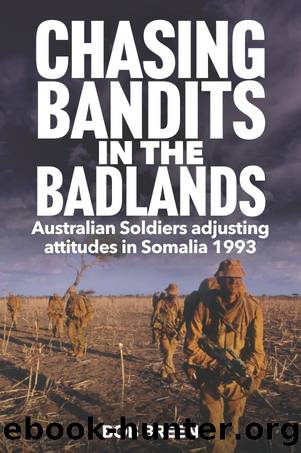Chasing Bandits in the Badlands by Bob Breen

Author:Bob Breen
Language: eng
Format: epub
Publisher: Big Sky Publishing
Published: 2022-01-15T00:00:00+00:00
CHAPTER 4
Taking Control
On 1 March, the 1 RAR Group celebrated the Australian Armyâs birthday. Two hundred cartons of beer and enough hamburger steak to feed all the Australian military personnel in Baidoa had arrived at 2.30 pm on the New Zealand Andover flight. The Australian Returned and Services League (RSL) donated the beer. Two platoons from D Company and B Company and half of B Squadron were the only combat troops available to enjoy a BBQ dinner and a few beers that evening. The remainder of the rifle companies, B Squadron and specialist platoons were on duty. Beer was kept aside for them to consume the next time they returned to Baidoa and could take time off.
On 3 March, 1 RAR Group companies rotated around the four operational tasks for the sixth time. Four and a half months was much longer than annual large-scale field exercises in Australia. The living conditions at the airfield were endurable for a couple of weeks when the adrenaline was high, and everything was new and exciting. After six weeks, the close living, the lack of privacy, sleep deprivation, other dangerous frustrations and the hot, dry, dusty conditions began to wear the diggers down. Blumer was concerned that his men were losing their concentration and motivation:
With seven weeks down and 10 or 11 ahead, the glamour and panache of the overseas deployment have worn off somewhat. We have a long haul to keep motivation going and troops interested.
Hurley continued to focus operations in Baidoa on protecting expatriate NGO staff. He wrote:
The security of NGOs at night is still our major concern. To deploy two companies in town, with sections in every compound, would severely limit our activities elsewhere, particularly on the roads at night. It is important to retain the confidence and desire to continue among the NGOs â should they lose their will and leave; we will have failed in our mission. The direct personal threat to them is our most important challenge.
By the end of the first week in March, paybacks for the firefights, confiscations, and house busts in February had not occurred. The level of reported violence in town had gone down significantly. The Australians appeared to have the initiative and received sufficient information from the locals to know they had friendly âeyes and earsâ throughout the metropolitan area.
The turnaround in four weeks since the unlucky first week in February was gratifying for Hurley and his commanders. They had worked hard to come to terms with an unfamiliar and dangerous urban environment. The credit lay with the young fight leaders and their diggers, who had not stepped back from provocation and âleaned inâ to give provocateurs consequences for their misbehaviour. They de-escalated violence through presence and decisive responses when challenged by shooters. By winning the firefights, they had deterred many more.
The expatriate NGO managers and their staff were grateful. an unprecedented gesture, they all signed a letter of appreciation on 10 March addressed to General Johnston, the UNITAF Commander, and later distributed
Download
This site does not store any files on its server. We only index and link to content provided by other sites. Please contact the content providers to delete copyright contents if any and email us, we'll remove relevant links or contents immediately.
The Radium Girls by Kate Moore(12022)
100 Deadly Skills by Clint Emerson(4921)
Rise and Kill First by Ronen Bergman(4782)
The Templars by Dan Jones(4685)
The Doomsday Machine by Daniel Ellsberg(4486)
The Rape of Nanking by Iris Chang(4208)
Killing England by Bill O'Reilly(4000)
Stalin by Stephen Kotkin(3961)
Hitler in Los Angeles by Steven J. Ross(3943)
12 Strong by Doug Stanton(3543)
Hitler's Monsters by Eric Kurlander(3331)
Blood and Sand by Alex Von Tunzelmann(3200)
The Code Book by Simon Singh(3185)
Darkest Hour by Anthony McCarten(3122)
The Art of War Visualized by Jessica Hagy(3004)
Hitler's Flying Saucers: A Guide to German Flying Discs of the Second World War by Stevens Henry(2754)
Babylon's Ark by Lawrence Anthony(2674)
The Second World Wars by Victor Davis Hanson(2524)
Tobruk by Peter Fitzsimons(2514)
